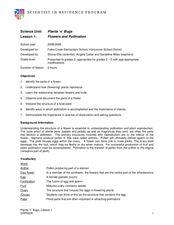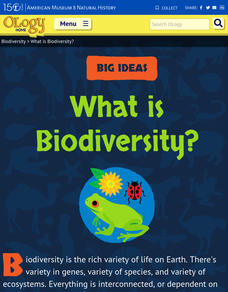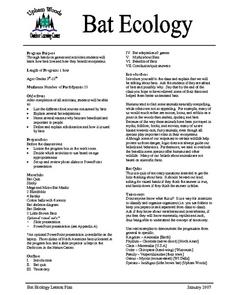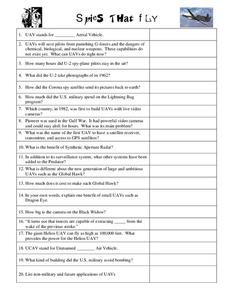Curated OER
How Manduca See
Third graders investigate how manduca sees and they discuss what they think the manduca might be thinking. They write a story about what an insect sees and does from the insect's perspective.
Curated OER
Flowers and Pollination
Students explore the environment by researching plant reproduction. In this pollination lesson, students define botany related vocabulary terms such as disc flower, petal and fertilization. Students dissect a flower with their classmates...
Forest Foundation
The Web of Life
Producers, herbivores, carnivores, omnivores, decomposers. To begin a study of the forest ecosystem, learners examine the connections among the members of ecological communities.
Curated OER
Jeopardy Game - Animals
Here is a fantastic Jeopardy-style game for elementary schoolers that's all about animals. This is one of the more thorough of this type of presentation.The 53 slides cover all sorts of topics about a variety of animals. There is an...
Curated OER
Hitchhikers in the Bathroom
Young scientists will go buggy over this resource. After reading a passage that describes the pseudoscorpion, individuals respond to questions about this clever arachnid and use a Venn diagram to compare the pseudoscorpion to a real...
Chicago Botanic Garden
Leaf Litter Ecology Lab
Some organisms spend their entire lives in leaf litter. The third in a series of six is a great lesson exploring the community of leaf litter. Groups gather and then spread leaf litter over white paper and remove leaves/twigs while...
Curated OER
Exploration of "Pillbugs"
Fifth graders define vocabulary terms, identify the characteristics of a pillbug, and create a dichotomous key. Then they examine the pillbugs and make observations and record these observations. Finally, 5th graders observe specific...
Curated OER
School Forest
Sixth graders explore the concept of biodiversity. In this biodiversity instructional activity, 6th graders discover a variety of planets and animals that live in forests, and how a rotting log benefits that environment. Students also...
American Museum of Natural History
What is Biodiversity?
Not all dogs are the same just like not all finches are the same. An interactive online lesson helps individuals learn about the causes and limitations to biodiversity. The clickable sections describe the basics of the genetics of...
Curated OER
Habitats: must live with them....cannot live without them.
Young scholars conduct an internet study regarding habitat, ecosystem, biome and the region they live in. They observe the habitat by visiting a State Park and observing the organisms in their habitat. In addition, they create their own...
Learning for Life
Lesson 7: Stimulants
Make sure your class is aware and informed of the various types of stimulant drugs that exist. Here, they can learn their alternate names and some of their harmful effects. While this is a very basic direct-instructional lesson, the...
Curated OER
Bat Ecology
Young scholars, through hands on games and activities, discover how bats live and how bats benefit ecosystems. They play a game designed to show them how echolocation works and another to show how mother bats locate their young through...
Curated OER
Spiders and their Webs
Students investigate spider webs. In this spider web lesson, students gain information about spider body parts and how they make their webs. Students simlulate what it is like to be a spider walking on their web. Students illustrate...
Curated OER
Caterpillars To Butterflies
Students observe the life cycle of a butterfly. They read butterfly/caterpillar themed books. They sequence the lifecycle from eggs on a leaf to an adult butterfly. They release their butterflies into a natural habitat after singing and...
Curated OER
Caterpillars To Butterflies
Students gain an appreciation of nature by teaching them about the life cycle of the butterfly. They set up a terrarium so they can observe the changes a caterpillar goes through.
Curated OER
Spies That Fly
In this spy aircraft learning exercise, students watch a video about unmanned aerial vehicles and other aircraft used by the military and answer 20 questions.
Curated OER
Too Bee Or Not To Bee
Students recognize that bees are important in the reproduction of plants and to the survival of animals. In this bee lesson, students become familiar with the parts of bees and how those adaptations help them pollinate plants. Students...
Curated OER
Trout Cookies
Students explore the external anatomy of a fish. In this anatomy and adaptations lesson, students look at an image of a trout and identify its various external features including fins, eyes, spots, parr marks and lateral line. Students...
Curated OER
Pond Life
Students recognize the habitats of animals that live near or in a pond. In this pond lesson plan, students examine pond water and look for pond organisms. Students observe organisms with a loupe and complete a worksheet.
Curated OER
Complete Metamorphosis
Students use a map and colored pins to plot the migration path of Monarch butterflies. They use data found at the Journey North website. Commas are also used in the activity to show how they are put in a series of words using butterfly...
Curated OER
Macroinvertebrate Sampling
Students identify macroinvertebrate species to investigate ecological systems and the relationship between humans and the environment.
Curated OER
Spiders are Special
First graders recognize that spiders are important natural predators. They work in small groups with simple field guides to identify as many of their spiders as they can.
Curated OER
Wacky Water Critters
Students visit a local creek or stream. They collect water samples from the creek and observe and sort the "water critters" they find in the sample, observing smaller organisms under a microscope if necessary. They identify each organism...
Other popular searches
- Insects and Bugs
- Bugs and Insects Crafts
- Bugs and Insects Art
- Insects and Bugs Stencils
- Theme Insects and Bugs
- Bugs and Insects Prue School
- Studying Bugs and Insects
- Bugs and Insects Pre School
- Bugs and Insects Worksheet
- Bugs or Insects Anatomy
- Insects, Lightning Bugs
- Bugs Insects Free

























